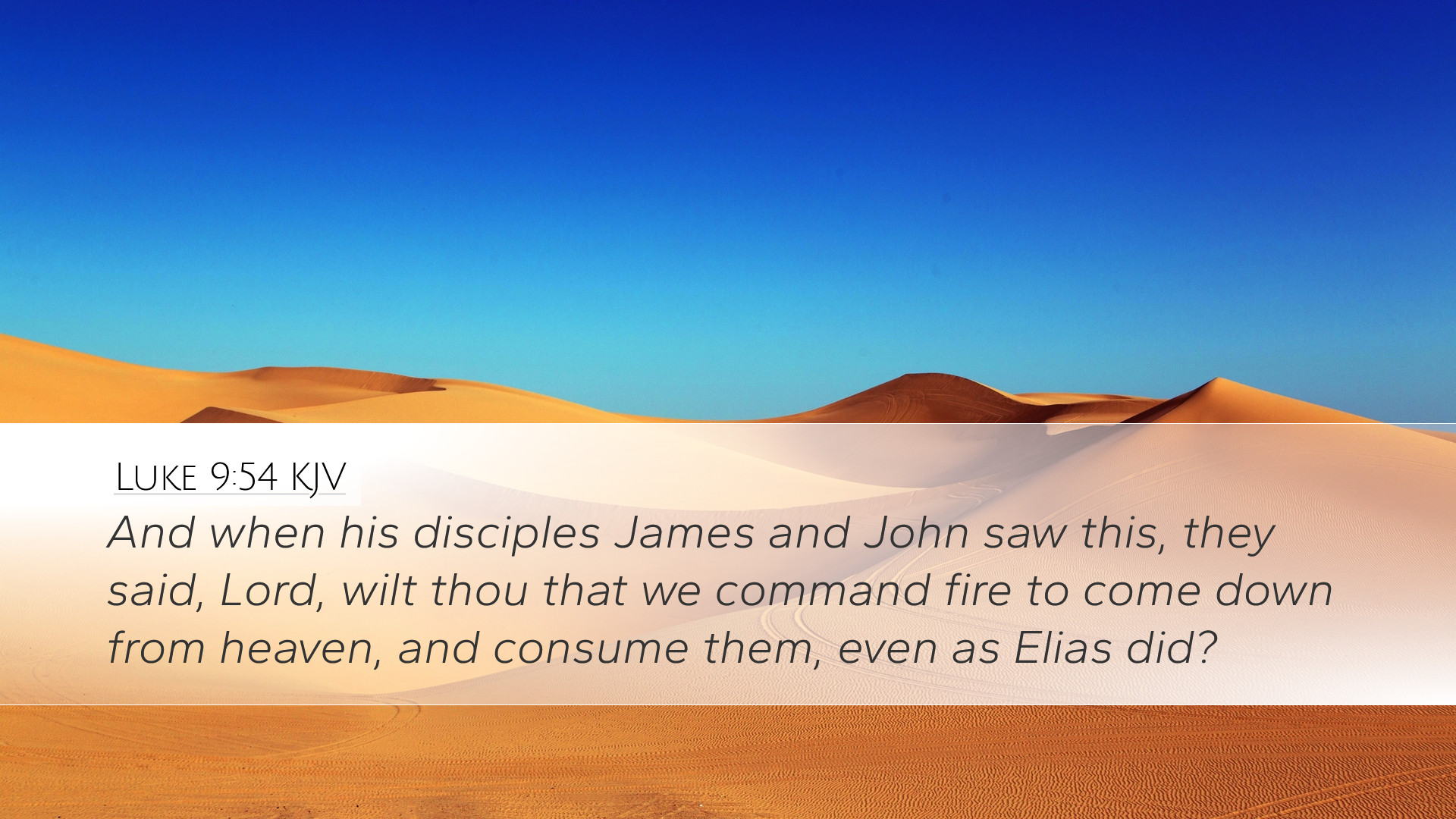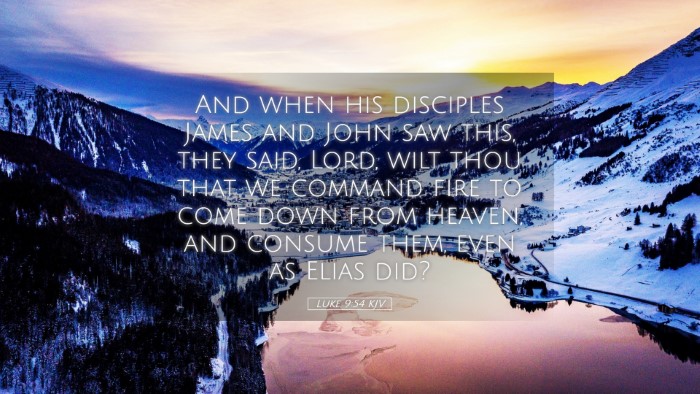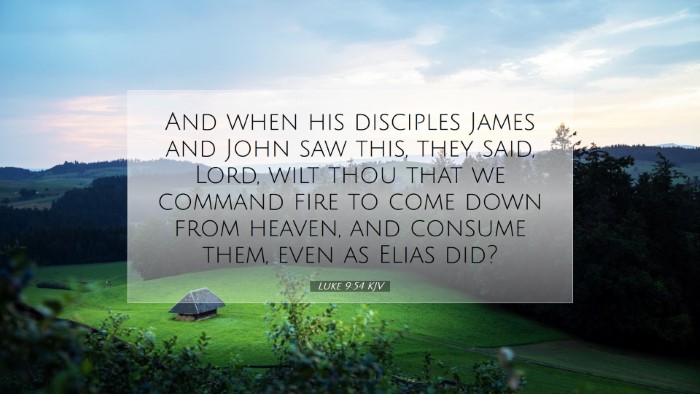Commentary on Luke 9:54
Verse: "And when His disciples James and John saw this, they said, Lord, wilt thou that we command fire to come down from heaven, and consume them, even as Elias did?" (Luke 9:54)
Introduction
In this verse, we witness a significant moment that reveals the disposition of the disciples, particularly James and John, often referred to as the "Sons of Thunder." Their reaction to the rejection of Jesus in a Samaritan village raises questions about the nature of discipleship, the essence of Christ's mission, and the spirit of vengeance versus the spirit of grace.
Contextual Background
To understand Luke 9:54, it is essential to consider the context surrounding Jesus' ministry. This section of the Gospel highlights the growing tension between Jesus and the Jewish authorities, as well as the broader social dynamics, including the animosity between Jews and Samaritans. The request of James and John to call down fire from heaven reflects an intense passion for Christ but also a misunderstanding of His purpose.
Insights from Matthew Henry
Matthew Henry emphasizes the fervency of James and John in their zeal for Christ's honor. He notes that their proposal is rooted in a desire for vindication. However, Henry warns against a spirit of retaliation, indicating that this mindset is incompatible with Christ's teachings on love and forgiveness. Instead of condemning the Samaritans, the disciples should have sought to understand their rejection of Jesus and to respond with compassion.
- Zeal without Knowledge: Henry describes their response as "zeal without knowledge," reminiscent of Paul’s sentiments in Romans 10:2. Their fervor, while commendable, was misguided, showcasing their lack of comprehension of Christ's mission, which was rooted in grace rather than judgment.
- Historical Context: He contrasts their desire to invoke the judgment seen in the ministry of Elijah (2 Kings 1:10-12) with Jesus’ mission of mercy, underscoring the transformational nature of Christ’s Kingdom as one of forgiveness rather than retribution.
Insights from Albert Barnes
Albert Barnes provides a thorough analysis of the historical and cultural significance of the disciples’ request. He notes that their reaction stems from a Jewish tradition that highly revered the prophets, including Elijah. The fiery judgment enacted by Elijah had long been a symbol of divine authority and power, which the disciples wished to emulate.
- Miscalculation of Christ’s Character: Barnes points out that the disciples err significantly in their calculation of Jesus’ character and mission. They forget that their Master came not to destroy lives, but to save (Luke 9:56). This contrast highlights the radical departure of Jesus’ teachings from the prevailing expectations of a militant Messiah.
- Correction by Christ: Barnes explains that the response of Christ to His disciples falls under His corrective ministry. Instead of affirming their desire, Jesus rebukes them by emphasizing love for enemies—a vital principle that would define His community and ethical teachings.
Insights from Adam Clarke
Adam Clarke enriches the commentary with a linguistic and historical analysis, noting that the request of James and John reflects a desire for potent demonstration rather than a reflective understanding of their calling as disciples of Jesus.
- Call to Ministry: Clarke emphasizes that the path of true discipleship involves humility, service, and an acceptance of rejection, contrasting sharply with the disciples' desire for vindication. The call to follow Christ is a call to suffer and serve, not to wield power.
- Disciples’ Misunderstanding: Clarke highlights that the disciples demonstrate a lack of grasp on the principles of the Kingdom, which is characterized by mercy and grace, instead longing for the powerful prophetic traditions that bore the judgment of God.
Reflective Insights for Pastors and Theologians
This passage compels us to reflect on our responses to rejection and hostility in our ministries. The disciples' initial reaction is a common one; when faced with opposition, the human tendency is often to respond with fire rather than grace. Pastors and theologians can draw significant lessons from this encounter:
- Understanding the Heart of Ministry: Discipleship calls for patience, understanding, and an unwavering commitment to embody the love and grace of Christ, even in the face of rejection.
- Rejecting Vengeance: The invitation to call down fire might resonate in our frustrations; however, the heart of Christ teaches that even our enemies are worthy of love and redemption.
- Focus on Compassion: In ministry, our actions should reflect the compassion of Christ. Instead of seeking revenge, we ought to listen, engage, and pray for those who oppose the message of the Gospel.
- Lessons in Humility: The posture of humility is critical in leadership. Recognizing our own failings and limitations can lead to a more profound understanding of God's grace, both for ourselves and others.
Conclusion
Luke 9:54 serves as a poignant reminder of the radical nature of Jesus’ teachings and the transformative call to discipleship. By integrating the insights gained from public domain commentaries, a clearer understanding emerges—one that urges our hearts toward grace over vengeance, love over hatred, and humility over pride. Discipleship in the footsteps of Christ demands that we reevaluate our responses and cultivate a spirit that reflects the heart of our Savior.


